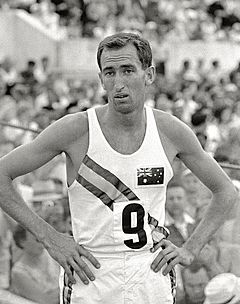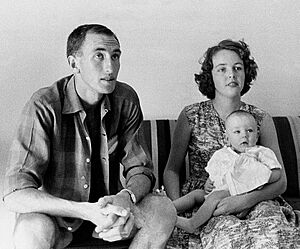Herb Elliott facts for kids

Elliott at the 1960 Olympics
|
||||||||||||||||||||
| Personal information | ||||||||||||||||||||
|---|---|---|---|---|---|---|---|---|---|---|---|---|---|---|---|---|---|---|---|---|
| Birth name | Herbert James Elliott | |||||||||||||||||||
| Nickname(s) | Herb | |||||||||||||||||||
| Nationality | Australian | |||||||||||||||||||
| Born | 25 February 1938 Subiaco, Western Australia, Australia |
|||||||||||||||||||
| Height | 5 ft 11 in | |||||||||||||||||||
| Weight | 150 lb | |||||||||||||||||||
| Sport | ||||||||||||||||||||
| Country | Australia | |||||||||||||||||||
| Sport | Middle-distance running | |||||||||||||||||||
| Coached by | Percy Cerutty | |||||||||||||||||||
| Achievements and titles | ||||||||||||||||||||
| Olympic finals | Rome 1960 | |||||||||||||||||||
| Personal best(s) | ||||||||||||||||||||
|
Medal record
|
||||||||||||||||||||
Herbert James Elliott, also known as Herb Elliott, is a famous Australian athlete. He was born on February 25, 1938. Many people consider him one of the greatest middle-distance runners of his time.
In August 1958, Herb Elliott broke the world record for the mile run. He finished the race in 3 minutes and 54.5 seconds. Later that month, he also set a new world record for the 1500 metres race. At the 1960 Rome Olympics, he won a gold medal in the 1500 metres. He even broke his own world record with a time of 3 minutes and 35.6 seconds.
Herb Elliott was amazing because he never lost a mile race in his entire career. He won 36 races over this distance. He also ran the mile in under four minutes 17 times. He stopped running professionally soon after the 1960 Olympics, when he was only 22 years old. After his running career, he worked in business. He was once the chairman of a large mining company called Fortescue Metals Group.
Contents
Early Life and Training
Herb Elliott was born in Perth, Western Australia, on February 25, 1938. His parents were Herb and Eileen Elliott. He went to Aquinas College, Perth, where he was a top student. The school had a strong sports program. This helped Herb develop his athletic skills.
On August 6, 1958, Elliott set a new world record for the mile in Dublin. Later that month, he broke the 1500 metres world record in Gothenburg, Sweden. His time was 3 minutes and 36.0 seconds.
His Coach, Percy Cerutty
Herb Elliott gave a lot of credit to his coach, Percy Cerutty. Cerutty was a unique coach. He inspired Herb to train harder and in a more natural way than other athletes. Cerutty often avoided the usual running track. He would talk about famous people like Leonardo da Vinci and Jesus to motivate his athletes.
Cerutty also took his athletes to a special training camp by the sea in Portsea, Australia. There, Herb would sprint up sand dunes until he was exhausted. Cerutty would push him, saying, "Faster, it's only pain." This intense training helped Herb become a champion.
Major Sporting Achievements
Herb Elliott achieved great success in major international competitions.
Commonwealth Games Success
At the 1958 Commonwealth Games in Cardiff, Wales, Herb Elliott won two gold medals. He won the 880 yards race and the mile race.
Olympic Gold in Rome
Two years later, at the 1960 Summer Olympics in Rome, Italy, Elliott won the gold medal in the 1500 metres. He set a new world record with his time of 3 minutes and 35.6 seconds. He finished 2.6 seconds ahead of the second-place runner, Michel Jazy from France.
Life After Running
After retiring from athletics, Herb Elliott pursued a career in business and continued to be involved in sports.
University Studies
Elliott first studied at the University of Melbourne. He received a scholarship from Shell Australia. After his Olympic win in 1960, he went on to study natural sciences at the University of Cambridge in England. He received another scholarship from Shell. He lived with his family in a house near Cambridge during his studies. He stopped running competitively in 1962.
Business Career
Elliott worked as the CEO of Puma North America. From 2001 to 2006, he was a board member at Ansell. In May 2005, he became the deputy chairman of Fortescue Metals Group. This company is one of the world's largest iron ore miners. In March 2007, he became the non-executive chairman of the company. On August 18, 2011, he moved back to the role of deputy chairman.
Sydney Olympics Role
Herb Elliott was one of the people who carried the Olympic Torch at the opening ceremony of the 2000 Summer Olympics in Sydney. He carried the torch into the stadium for the final part of its journey before the Olympic Flame was lit.
Family Life
On May 2, 1959, Herb Elliott married Anne Dudley. She was a hairdresser from Perth. They have six children together.
Honors and Recognition
Herb Elliott has received many honors for his achievements and contributions.
- In 1986, he carried the torch of peace to the MCG when Pope John Paul II visited Melbourne.
- His running career inspired an Australian television play in 1962 called The Runner.
- In 1964, he was made a Member of the Order of the British Empire (MBE).
- In 2002, he was appointed a Companion of the Order of Australia (AC). This was for his leadership in developing sports in Australia. It also recognized his involvement in the Olympic movement and his support for youth, health, and cultural organizations.
- He is recognized as an Australian Living Treasure.
- In 1985, he was inducted into the Sport Australia Hall of Fame.
- Fortescue Metals Group named a new port after him. The port is located near Port Hedland, Western Australia.
See also
 In Spanish: Herbert Elliott para niños
In Spanish: Herbert Elliott para niños
 | William L. Dawson |
 | W. E. B. Du Bois |
 | Harry Belafonte |


